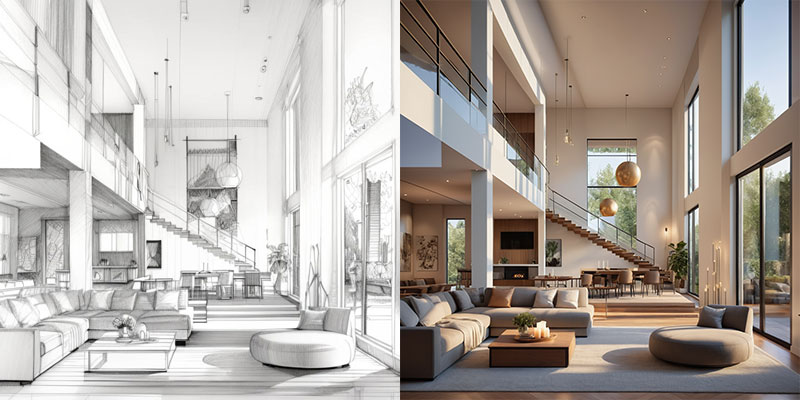友人を招待して、お二人とも無料コインをゲット

there are many windows and a table in the room
Mehrnaz Morovati
AI画像ジェネレータ
v1
Designing a workspace that incorporates natural elements is essential for enhancing well-being, creativity, and productivity. An effective layout should feature an open floor plan that allows for airflow and collaboration, while creating distinct zones for activities, ensuring seamless transitions between collaborative areas, quiet workspaces, and break zones. Maximizing natural light is crucial; position desks near windows and use glass partitions to let light permeate deeper into the space. The incorporation of indoor plants, such as snake plants and peace lilies, along with living walls or vertical gardens, adds vibrant colors and improves air quality. Choosing sustainable furniture made from reclaimed wood or bamboo, and using eco-friendly finishes, contributes to an organic feel. A color palette inspired by nature, featuring earth tones and soft blues, fosters a calming ambiance, while accent walls can enhance this effect. Sound management through the use of acoustic panels and the soothing addition of indoor water features can create a tranquil environment. Providing outdoor connectivity and views of nature further enhances this relationship with the outdoors. Additionally, incorporating wellness areas such as mindfulness spaces and inviting cafeteria zones with natural materials and abundant plants can encourage relaxation and a positive work culture. Ultimately, this holistic approach to workspace design leads to a healthier and more productive environment.
スタイル:
写真撮影-ドキュメンタリー写真11
シーン:
異星の惑星,宇宙ステーション,未来都市,ジャングル,オフィススペース
アーティストリー:
100%
比率:
1:1
0
リミックス
1
いいねまだコメントはありません
類似の内容
there are many windows and a table in the room
Mehrnaz Morovati
AI画像ジェネレータ
v1
Designing a workspace that incorporates natural elements is essential for enhancing well-being, creativity, and productivity. An effective layout should feature an open floor plan that allows for airflow and collaboration, while creating distinct zones for activities, ensuring seamless transitions between collaborative areas, quiet workspaces, and break zones. Maximizing natural light is crucial; position desks near windows and use glass partitions to let light permeate deeper into the space. The incorporation of indoor plants, such as snake plants and peace lilies, along with living walls or vertical gardens, adds vibrant colors and improves air quality. Choosing sustainable furniture made from reclaimed wood or bamboo, and using eco-friendly finishes, contributes to an organic feel. A color palette inspired by nature, featuring earth tones and soft blues, fosters a calming ambiance, while accent walls can enhance this effect. Sound management through the use of acoustic panels and the soothing addition of indoor water features can create a tranquil environment. Providing outdoor connectivity and views of nature further enhances this relationship with the outdoors. Additionally, incorporating wellness areas such as mindfulness spaces and inviting cafeteria zones with natural materials and abundant plants can encourage relaxation and a positive work culture. Ultimately, this holistic approach to workspace design leads to a healthier and more productive environment.
スタイル:
写真撮影-ドキュメンタリー写真11
シーン:
異星の惑星,宇宙ステーション,未来都市,ジャングル,オフィススペース
アーティストリー:
100%
比率:
1:1
0
リミックス
1
いいねまだコメントはありません



























